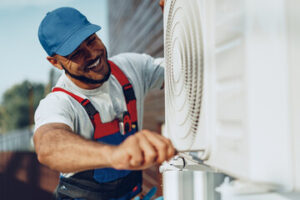Air Conditioning Repair Round Rock TX is a service that restores an HVAC system to full working order. The process involves inspecting the various components, servicing what needs it and making any repairs deemed necessary.
Most AC issues can be easily resolved with a bit of troubleshooting. If you can, try these steps before calling in a professional.
The evaporator coil is where your air conditioning system absorbs heat from indoor air to cool it. If it becomes dirty, your AC will take longer to cool your home and will use more energy to do so. This is especially true in Florida’s hot and humid climate. Dirty coils can also cause your unit to ice over which can be dangerous.
A dirty evaporator coil is usually the result of poor maintenance and cleaning. Air filters should be changed regularly and the evaporator coil should be cleaned at least once per year to prevent the accumulation of dust, dirt, and grime. This is a simple procedure that can be done by homeowners using a brush and household detergent. Once the loose dirt is removed, the coil can be rinsed with water to remove any remaining deposits. This will also help keep the coil from becoming too dirty and reduce the amount of dirt that is drawn into the coil during operation.
Airflow restriction is another common problem that causes the evaporator coil to become clogged. This can be caused by a dirty air filter or blockage of return vents. If your return vents are blocked by furniture, rearranging it may allow for more proper airflow. Often times a frozen evaporator coil is caused by a malfunctioning thermostat that fails to tell the unit to shut down as temperatures fall at night.
Another common cause of evaporator coil problems is lack of refrigerant. This is why yearly inspections and regular maintenance is so important. A qualified HVAC technician will check the evaporator coil and other parts of your unit for leaks, which are very common and are easy to repair.
If you see signs that your evaporator coil is clogged, it’s important to call a professional right away. Left untreated, it can lead to a costly compressor failure and expensive electrical bills. Changing the air filter and scheduling annual tune-ups can greatly reduce the chances of expensive evaporator coil repairs or replacements in the future. Contact a local air conditioning company for advice or to schedule a service.
Compressor
The compressor is the heart of the air conditioning system and plays a vital role in circulating refrigerant throughout your home, absorbing and dissipating heat. This process is what makes our lives so comfortable and allows us to work, play, and rest in cool conditions. Because of its crucial role, the compressor is very sensitive to problems and can experience breakdowns and even complete failure.
One of the most common causes of AC compressor damage is improper maintenance. The best way to protect your compressor is by having a professional HVAC technician perform regular maintenance on your system.
Regular maintenance will help your AC unit operate more efficiently and extend the life of your compressor. During a regular service appointment, your technician will check the compressor for any obvious signs of damage or failure. He will also clean the condenser coil and inspect the capacitor for signs of deterioration. Other preventive measures include regularly replacing the air filter and ensuring that the thermostat settings are accurate. It is also important to monitor and maintain adequate levels of refrigerant, as a shortage or an overabundance will affect the compressor’s function.
A well-functioning compressor will also save on energy costs. A poorly functioning AC compressor will use a lot of power in order to do its job, which will end up costing you more money on your utility bills.
There are many different problems that can plague an air conditioner compressor. Some can be fixed quickly and easily, while others may require a complete replacement. Some of the most common problems include:
Unusual Noises: Clunks, squeals, or clunks when your compressor turns on could indicate that there is a problem with the compressor clutch. Leaking Refrigerant: Seeing puddles of refrigerant under your outdoor unit could signal that your compressor is overworking or that there is a leak.
If you notice any of these warning signs, it is important to contact your air conditioning technician right away. A professional can fix these issues before they turn into more serious and costly problems. Abiding by simple maintenance tips like keeping the area around your outdoor unit free of debris and scheduling regular professional services will also go a long way to prolonging the lifespan of your compressor.
Contactor
A contactor is like a switch that controls the flow of electricity to different components of your AC system. It is used to provide power and cut it off from things like the compressor and fan motors. It is similar to a drawbridge in that it allows traffic freely to pass over but, unlike the bridge, when the contactor opens, it shuts off the high-voltage power supply to the motors.
In some instances, the contactor can develop a problem called pitting. This happens when the metal contacts within the contactor are corroded due to being exposed to a high level of heat and voltage for prolonged periods of time. Pitting can prevent the full surface of the contact points from making contact with each other, meaning that the transfer of electricity won’t happen.
This is an issue that needs to be dealt with immediately, because it could cause your air conditioning unit to not turn on or maintain the correct cooling capacity. A professional HVAC technician will be able to diagnose the problem and find a solution.
If your contactor is beginning to fail, you will hear a clicking noise that occurs when the system tries to engage and disengage. This is a clear sign that the electrical connections are not working correctly. The clicking sound will occur more frequently as the contactor continues to fail.
A faulty contactor will also stop closing, which means the system won’t get the power it needs to start up and cool your home. This can be extremely frustrating because your air conditioner may not be working as it should, and you will be left with a hot and stuffy home.
You can perform a visual inspection on your contactor by shutting off the power to the air conditioner at the circuit breaker and opening the access panel. Look for melted or burnt areas of the contactor and be sure to use the proper safety equipment before performing any tests. If you aren’t comfortable with this, a trained HVAC professional can inspect your contactor to see if there is any physical damage that would prevent the flow of electricity.
Blower Motor
The blower motor is responsible for pushing the air through your ductwork, whether that air is cool or warm. It is one of the most important parts of your HVAC system and is a critical part of keeping your home comfortable.
A faulty blower motor can lead to many problems with your HVAC system. If you notice a problem, call your heating and cooling professional right away to ensure that the issue is addressed before it worsens.
If your blower motor is not working properly, you will most likely notice a decrease in airflow through your vents. If the airflow is not adequate, you may want to inquire about duct cleaning or sealing to improve your indoor air quality. You will also likely see a higher energy bill as your system struggles to keep up with the temperature in your home.
Another sign of a faulty blower motor is the presence of odd sounds coming from your vents. Rattling or banging noises often indicate that a part has come loose and is hitting other components within your HVAC unit. Screeching or squealing noises are often caused by the bearings of your blower motor and can be fixed with lubrication.
If you notice a burning smell coming from your vents, this is usually an indication that your blower motor is overheating. This can be dangerous and it is always a good idea to turn off your unit until you are able to speak with a professional.
A blown fuse is another common issue with your blower motor. A fuse protects electrical circuits from overheating and a sudden surge in electricity can cause it to break down. You will typically need to replace the fuse before your blower motor will start working again.
Faulty blower motors are often a result of improper maintenance and a lack of regular repairs. You can help your blower motor last longer by ensuring that it is regularly cleaned and well-oiled. It is also important to keep up with regular repairs to the other components of your HVAC unit, such as the compressor, condenser coils, and contactor.
